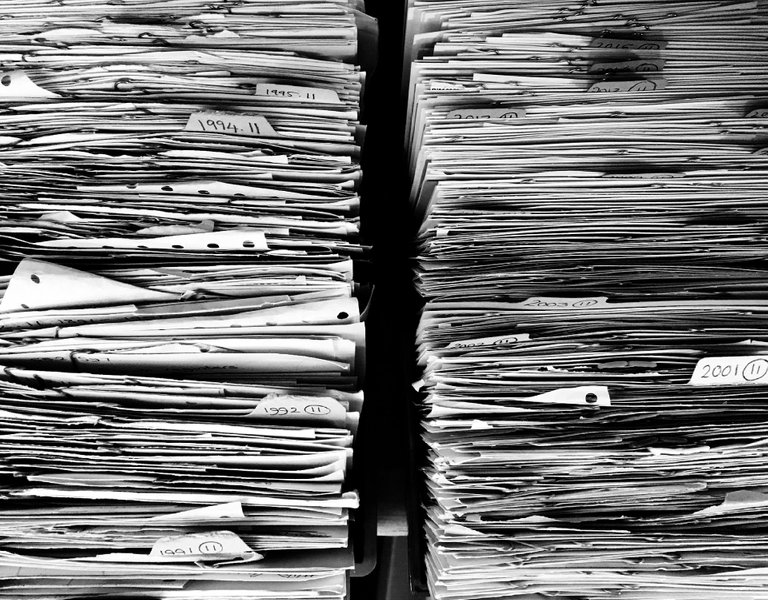
Source - feel the weight of that ^^^.
Long ago, I used to have a problem with paperwork. Actually, I still have a problem with paperwork, usually of the world's making, but I have different approach to it.
It's surprising how much paperwork there still is. Bills and notifications still come through the letterbox, and catalogues and flyers and community newspapers. We do have lovely delivery people, though. My favourite is the Yodel driver. He told me the other day that he is always happy when he has a delivery for my row of houses.
Long ago, all that paperwork used to pile up on the kitchen table, usually until it had formed an unsteady pile that threatened to tumble onto the floor at every moment. At that point, feeling hard done by, I would make a massive pot of coffee and sit down to go through them. It was a task that really irritated me.
Then I got a job where I was working away from home for two or three days a week. I'd leave for London on a Tuesday morning and come home late on Wednesday or Thursday after a community meeting in the evening. I started clearing my desk on a Monday, sorting out bills and putting away papers I had been working on, throwing out anything that wasn't needed.
Much to my surprise, this had a profound effect on my well-being. I experienced a new-to-me peace of mind knowing that everything was done and dusted. I loved coming home to an empty desk. Some time later, I read the phrase "cluttered desk, cluttered mind" and that resonated with me: clearing my desk helped to clear my mind. It was a lovely feeling.
I think that's a major thing about having more stuff than you can manage: it fills up your mind as well as your desk and cupboards and house. Paper, even in this digital age, is still coming at you all the time - packaging and magazines and greetings cards. It sucks away at your soul.
One time I was arranging a meeting with a work colleague when she said, "Oh, I can't do that day, we're having a Tidy Friday in the office." Curious, I asked her what she was talking about. She explained that, once a quarter, after they had done their reporting, her organisation would have a Tidy Friday when completed work was archived; and the archives were reviewed and any files that had reached their expiry date were disposed of.
This was a novel idea to me: a day set aside regularly to sort things out - a major desk clearing that extended to the whole organisation. I loved the name, too: Tidy Friday. Who wouldn't be captivated by that?
In a different life, I discovered how much Tidy Friday is needed: I was working with the health service and a hot topic was information governance. This had an added element to retaining records of decisions and reporting, because it applied to sensitive information like patient records.
Among many horror stories that I learned during that time, including patient records being fly-tipped on waste ground, the huge monetary cost of having too much stuff, in this case records and other information, was brought home to me.
One health trust was storing their archives in a warehouse that was costing them a million pounds a year. At the time, I was responsible for co-ordinating community services for people with long-term health conditions who wanted to live a more healthy lifestyle. A million pounds was two and half times the budget we had for this work.
With that extra money, we would have been able to work with another 900 people every year, helping them to have a better quality of life and better health outcomes; we would have saved the NHS nearly three times that amount through reduced need for medication and acute services and, through creating additional jobs, that money would have had a multiplier effect and improved the local economy. Instead, it was going into a resource drain and an environmental eye-sore.
No one knew what information and records were being stored or why. No one was checking it and disposing of expired information. Each year, they crammed more into the warehouse and had reached the stage of having to look for another warehouse to save even more stuff ...
Clutter gone mad.
It's useful to reflect on for a domestic setting: what is the cost, financial and for your peace of mind, of having more than you can manage or stuff that you don't need?
I've taken up Tidy Friday as a regular thing, although it's once a week, rather than once every three months. I put all my running around tasks on that day: clearing my desk (of course), taking returns to the post office, making appointments, checking my bank balance.
Sometimes, there are leftover work things, too - catching up with a colleague and getting clearance for future plans, finishing off reports, archiving. Having Tidy Friday builds in some contingency time, you have a little buffer where you can catch up if things didn't work out as you planned during in the week.
My aim, though, is that everything is done by 2.30pm and then it's the weekend!
A response to Option 1 in The MINIMALIST's blogging challenge - Before and After: Your Minimalist Journey


Three things newbies should do in their first week and, for most things, forever afterwards!
HIVE UK MEET-UP: Saturday 18 June 2022 | 12.00-5.00pm | Halifax, West Yorkshire.


